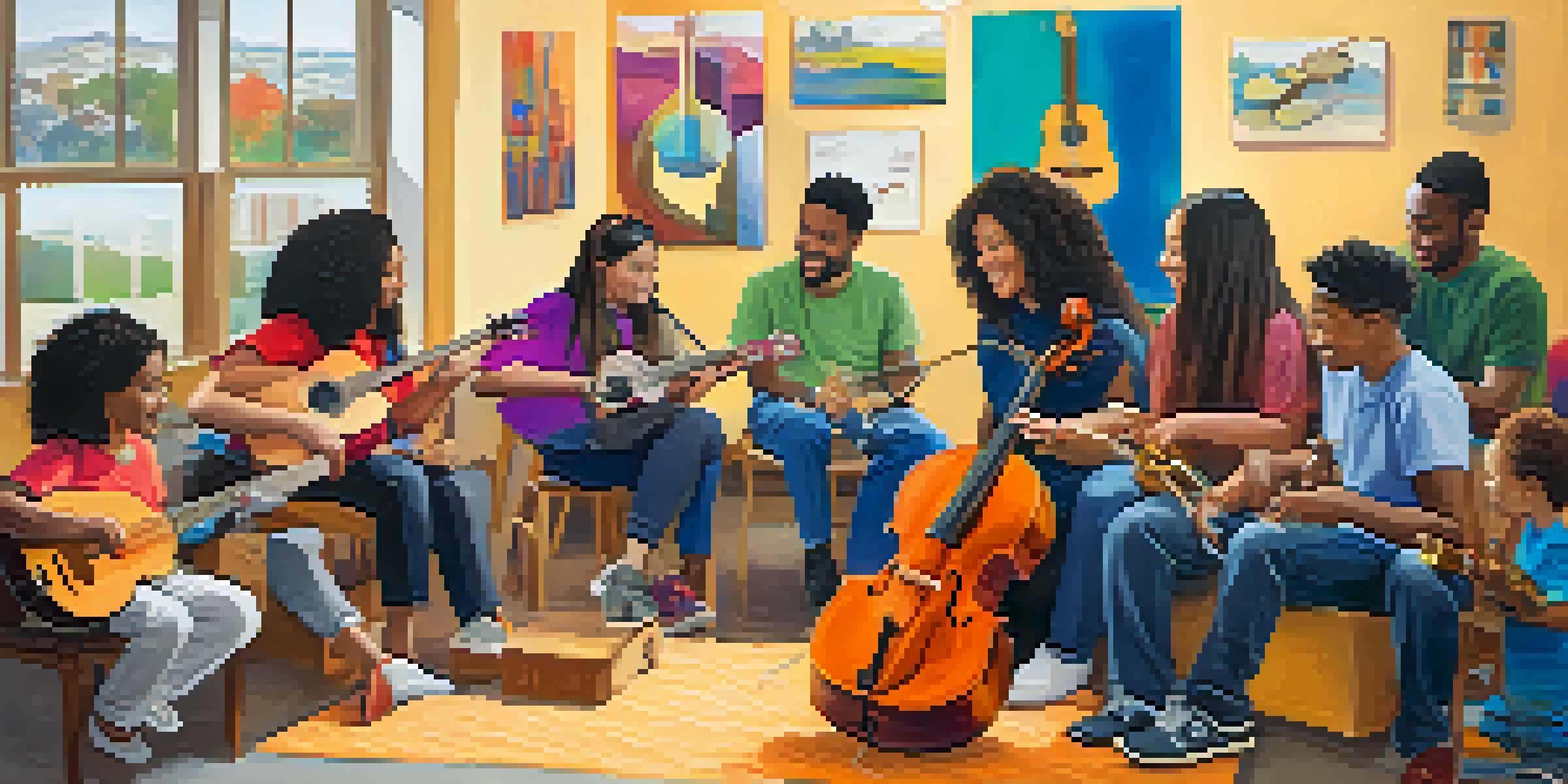Transcending Trauma: Music's Therapeutic Impact on Communities

Understanding Trauma and Its Effects on Communities
Trauma can disrupt the fabric of communities, leaving emotional scars that linger long after the initial events. Whether caused by violence, natural disasters, or other crises, the impact can create a sense of disconnection among individuals. Understanding how trauma manifests is crucial, as it often leads to feelings of isolation and despair, making recovery challenging.
Music can change the world because it can change people.
Communities affected by trauma may experience a range of emotional responses, including anxiety, depression, and even post-traumatic stress disorder (PTSD). These responses can hinder social interactions and community cohesion. Recognizing these effects allows us to identify the need for healing methods that can restore connections and promote well-being.
This is where music therapy steps in, acting as a bridge to bring people together. By tapping into the universal language of music, communities can find common ground and begin to heal collectively. The power of music to evoke emotions and memories can be a catalyst for shared experiences and recovery.
The Science Behind Music Therapy
Music therapy is not just an art form; it’s supported by a wealth of scientific research. Studies have shown that engaging with music can significantly reduce stress and anxiety levels, promoting relaxation and emotional release. The brain responds to music in unique ways, enhancing mood and even altering brain chemistry to support healing.

When individuals participate in music-making, whether through playing instruments or singing, they activate multiple areas of the brain. This engagement leads to improved emotional regulation and cognitive function, which are essential for overcoming trauma. Essentially, music serves as a natural antidote to the psychological burdens that trauma can impose.
Trauma Disrupts Community Connections
Trauma can create feelings of isolation and despair, making recovery challenging for affected communities.
Moreover, music therapy can foster social connections, as it often involves group activities that encourage collaboration. When people come together to create and share music, they build trust and understanding, essential components for community healing. It's this communal aspect of music that makes it particularly powerful in addressing trauma.
Case Studies: Music Therapy in Action
Numerous case studies illustrate the transformative impact of music therapy on traumatized communities. For instance, after a devastating natural disaster, a community center organized music therapy sessions to help residents process their grief and loss. Participants reported feeling more connected to one another and found solace in sharing their experiences through music.
Where words fail, music speaks.
Another compelling example is the use of music therapy in conflict-affected areas. In refugee camps, music programs have been implemented to help individuals cope with their traumatic experiences. These sessions not only provide an emotional outlet but also foster a sense of unity and resilience among participants, proving that music can transcend cultural and linguistic barriers.
These real-world examples highlight how music therapy can be tailored to meet the specific needs of communities. Whether through structured programs or informal gatherings, the act of creating music together can serve as a powerful therapeutic tool, enabling individuals to reclaim their narratives and rebuild their lives.
The Role of Community Organizations in Music Therapy
Community organizations play a pivotal role in facilitating music therapy programs. By partnering with trained music therapists, these organizations can offer structured sessions that cater to the unique needs of their communities. This collaboration ensures that the therapeutic benefits of music are accessible to those who need it most.
Moreover, community organizations often have a deep understanding of the cultural contexts in which they operate. This knowledge allows them to design music therapy programs that resonate with the local population, ensuring greater participation and engagement. Tailoring music therapy to reflect community values and experiences enhances its effectiveness.
Music Therapy Fosters Healing
Music therapy serves as a powerful tool for healing by promoting emotional release and fostering community connections.
In addition to providing direct therapy, these organizations often create safe spaces for individuals to express themselves creatively. By fostering an environment where music can flourish, they contribute to a broader culture of healing and resilience. The collective power of community support amplifies the positive impact of music therapy.
Music as a Tool for Restoring Cultural Identity
For many communities affected by trauma, music serves as a vital link to cultural identity. Traditional songs and rhythms can evoke memories of heritage, providing a sense of belonging and continuity. Engaging with these cultural expressions not only honors the past but also empowers individuals to reclaim their identities amidst the chaos of trauma.
Music can also serve as a vehicle for storytelling, allowing individuals to share their experiences and histories. This process of sharing can foster understanding and empathy within communities, creating a shared narrative that strengthens bonds. By highlighting cultural narratives through music, communities can cultivate a sense of pride and resilience.
Additionally, revitalizing traditional music practices can have a therapeutic effect, helping individuals reconnect with their roots. This reconnection often leads to a renewed sense of purpose and community cohesion. In this way, music becomes a powerful tool for cultural restoration and healing.
Challenges and Limitations of Music Therapy
While music therapy offers numerous benefits, it's essential to acknowledge its challenges and limitations. Access to qualified music therapists can be a significant barrier, especially in underserved areas. Without trained professionals, communities may struggle to implement effective music therapy programs.
Moreover, cultural differences can impact the acceptance and effectiveness of music therapy. What resonates with one community may not resonate with another, highlighting the importance of culturally sensitive approaches. Ensuring that music therapy aligns with the values and traditions of the community is crucial for its success.
Cultural Identity Through Music
Engaging with traditional music helps communities reclaim their identities and fosters a sense of belonging amidst trauma.
Finally, it's important to recognize that music therapy is not a one-size-fits-all solution. While it can be highly effective for many, some individuals may require additional forms of support or therapy. Integrating music therapy with other therapeutic practices often provides a more comprehensive approach to healing.
The Future of Music Therapy in Community Healing
As awareness of the therapeutic benefits of music grows, the future of music therapy in community healing looks promising. More organizations are recognizing the value of integrating music therapy into their mental health initiatives. This trend suggests a shift towards more holistic approaches to trauma recovery.
Advancements in technology also offer new avenues for music therapy. Online platforms and virtual sessions can make music therapy more accessible, reaching individuals who may not have access to in-person programs. This innovation could bridge gaps in care and provide support to those in need, regardless of location.

Ultimately, the future of music therapy lies in its adaptability and ability to resonate with diverse communities. By continually evolving and responding to the needs of individuals, music therapy can remain a vital tool for healing and connection in the face of adversity.